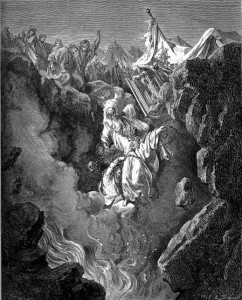
“Death of Korah, Dathan, and Abiram” by Gustave Doré
In parashat Korach, the Torah recounts the eponymous leader’s rebellion against Moses and Aaron. Korach’s rebellion was two-fold: both against the leadership of Moses, and against the priesthood of Aaron. Regarding the latter, Korach tried to bring the holy incense offering that only a kohen was allowed to do, and he failed miserably. The tremendous sin of Korach and his several hundred followers—along with the many Israelites that they had, at least temporarily, won over to their side—left a stain on the Jewish people for centuries afterwards. This stain was only rectified by another great dispute between two Jewish leaders and their schools: Hillel and Shammai. In fact, the Zohar says some incredible things about these disputes, which originate all the way back on the Second Day of Creation. Continue reading
